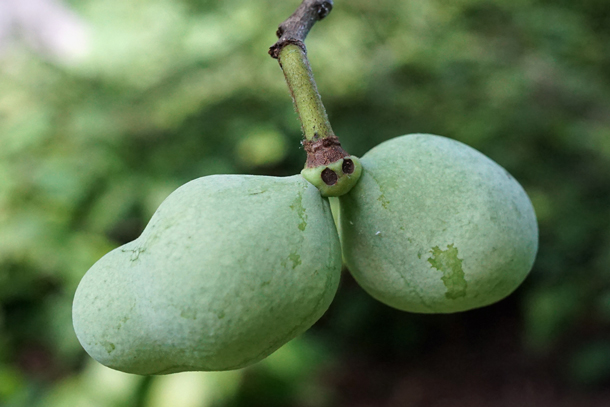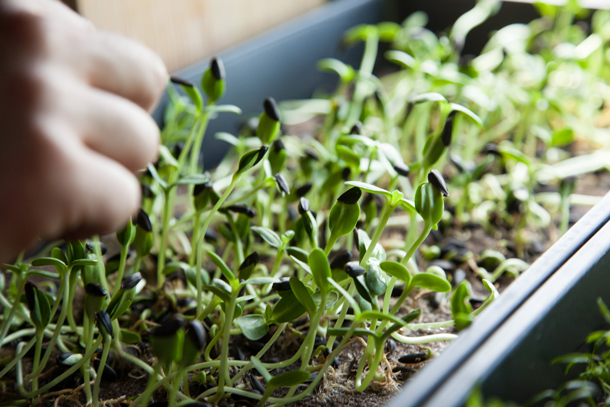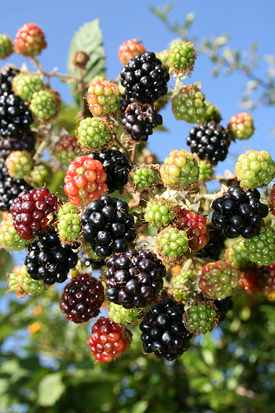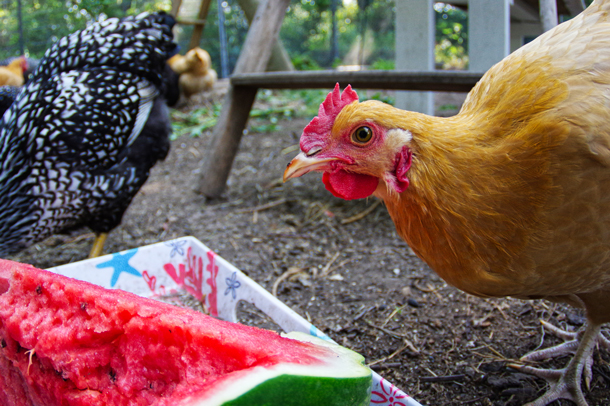Home Bound Gardening
Air Date: Week of April 3, 2020

Paw paw trees can grow in moist areas and survive temperatures of about -25 degrees Fahrenheit. They provide a rich tropical fruit and their flavor has been compared to that of mangoes and bananas. (Photo: Plant Image Library, Flickr, CC BY-SA 2.0)
At a time when the COVID-19 pandemic has led most of the American population to practice physical distancing, gardening can provide comfort and improved health. Landscape designer Michael Weishan, the former host of the PBS series The Victory Garden, joined Living on Earth's Bobby Bascomb to share the joys of tending to a vegetable garden, keeping chickens and enjoying the fruits of a small orchard, and to offer some advice about what to get in the ground now.
Transcript
CURWOOD: Seed companies are reporting record sales this spring. With so many people isolated at home and the economy so wobbly, for those with the space it does seem like a fine time to grow some food. So for some tips on how to get started with gardening we reached out to Michael Weishan. Years ago he did regular gardening segment here on Living on Earth. He then had his own show on NPR , and went on to host the Victory Garden on PBS. Today Michael owns a landscape design company outside Boston. He spoke with Living on Earth’s Bobby Bascomb, who is also an avid gardener and keeps a few chickens.
BASCOMB: So where are you right now? And how are you dealing with, you know, the isolation at the moment?
WEISHAN: Well, you know, in some ways, if you're a gardener, you're never that isolated. I have a greenhouse full of friends and ducks and chickens and geese here. I have a small property outside of Boston. And they require tending. And so you know, in the garden, nature goes up, it gets your mind off a lot of other things.
BASCOMB: Right, for sure. You know, I keep thinking the one saving grace of this is, at least this outbreak is in the Spring, you know, we can get outside and of course, it's the best time to start planting a garden, generally speaking, thOUGH what's, what's good to start right now in the garden?
WEISHAN: Well, you know, obviously depends on where you are. But here in the Northeast, all the cold weather crops can go go in. And I'm thinking at the moment mostly about vegetable gardening, not only because, you know, we'd love to have fresh produce that I don't have to have any risk of harvesting or purchasing, but also because that's what really goes on at this time of year in terms of new activities. But pretty soon it'll be time to plant any type of seeded annuals and flowers for the summer garden, certainly all the vegetables, it's time to start now indoors, tomatoes and peppers and all those things. So there's plenty, plenty to do.
BASCOMB: Mm hmm. But right now, you could throw some pea seeds in the ground lettuce, spinach, that sort of thing would be okay.
WEISHAN: Yeah, absolutely. As a matter of fact, the leak we start them generally in January indoors, so they're ready to go outside, as are some of the onion sets. Anything that's cold hardy, the peas in particular would very much thrive at this time, as long as it's not too damp.
BASCOMB: Well, you and I are both in New England but what about other parts of the country where maybe it's warmer or, or even colder? What's a good thing to start, say on the West Coast or in the middle of the country?
WEISHAN: Well, in the beautiful West Coast, like for instance, in California, Oregon and Seattle, I mean, they're very much into full spring now. So anything is about you know, ready to go. The nurseries that are open, of course, are fully stocked. And plants have any type of descriptions, you know, in California they can grow a lot of this stuff year round. In the south again, they're just ahead of where we would be up here in the North by about a month or so. So they will be planting all the warm weather crops now the tomatoes and other things because their frost dates have passed. So any you know, non hardy annuals, non-hardey perennials, all the types of material that we would normally get around to planting here in the New England in May is high time in the Southern states.
BASCOMB: Well, for someone that's maybe never grown a thing but they're trapped inside right now and looking at gardening is maybe you know, something to keep themselves busy a new hobby. What are a few things that are easy to grow, that anybody could get started with?
WEISHAN: Well, there is such a new explosion of houseplants. As people's garden sizes have condensed and frankly, a lot of people are gardenless gardeners they live in apartments or other places. There are just an amazing number of plants available. There's some really great specialty nurseries where you can order plants for almost any type of light situation. I mean, there are some houseplants you only have to water once or twice a month so for people who travel or people just don't like watering, that's a really great option.
BASCOMB: I went through a stage where I was growing micro greens I was growing a ton of micro greens I've kind of stopped now but that seems like a good option too. You don't need a lot of space and they don't even really need a whole lot of sun.

Microgreens are a simple way of incorporating fresh ingredients for cooking at the comfort of your home. Some of the post popular microgreens include pea shoots, radish sprouts, sunflower shoots and wheatgrass. (Photo: Plant Chicago, Flickr, CC BY-NC-ND 2.0)
WEISHAN: Anything that is a leaf plant generally requires more sun than not, but the micro greens are a really good option. I for instance, have started to grow just on flats on my back deck. Most of the herbs that I would grow in the garden like cilantro, arugula, all these small little lettuce greens because it gets them up out of the way and they don't get eaten by every every test in the world or the you know the chickens can't get into them either which you know if you have chickens you know that they're notorious if they get out of their coop area, you know, in terms of destroying very quickly a garden bed.
BASCOMB: Yeah, I have three chickens actually, my daughters have named them Snowball, Flip-Flop and Sheila and they're, they're a lot of fun! You have chickens as well, is that something you think that is a good option for people?
WEISHAN: I have been a huge, huge proponent of everyone having chickens. You don't need a rooster. You just need a couple of hens. And you know the nice thing that most people don't realize is that chickens are by nature omnivores, they eat anything. Now mostly we feed them grain when you buy food at the store, for instance, pellets and things but during both world wars, the governments here and in Great Britain urged people to have chickens to feed them food scraps because you can totally raise chickens on all the scraps from your table. And so instead of wasting any food at all, and they love everything, spoiled yogurt, old pasta, you know any greens you have. One of their favorites, for instance is watermelon rind, which sounds totally strange but they will literally eat it until just the film of the exterior skin remains they just just love it. So you know, all the bits of rice, little bits of meat, anything that you have can go out to the chickens and they just love it and produce these spectacular eggs. So it's a complete circle. You know, if you have the room in the space, it's a wonderful thing. And the eggs, of course are phenomenal they don't taste anything like the eggs from the store.
BASCOMB: I have an ongoing, let's call it discussion with my husband, he always wants to give the chickens the leftover eggs from breakfast, and I feel like that's cannibalism and gross. What's your opinion?
WEISHAN: It is actually very, very good for them.

With the right conditions and rich soil, berries can almost grow themselves. Blueberries and currants can be planted year-round, while raspberries can be planted during winter and spring. (Photo: John, Flickr, CC BY-SA 2.0)
BASCOMB: Really?
WEISHAN: Yes, absolutely. The egg shells in particular should go back because they have a terribly hard time getting enough calcium in their diets unless they're allowed to free range. And so if you ever drop an egg in the coop, they immediately run to eat it and eat the shells and eat the yolk. And so that's actually very highly nutritious for them. So the egg shells in particular, you should always send back to the chickens.
BASCOMB: Hmm. All right. Well, that's good to know. But you know what now I'm gonna have to go tell my husband that he was right, so..
WEISHAN: That's always the toughest part.
BASCOMB: Yeah, exactly. What about some easy fruits that people might think about growing?
WEISHAN: Well the easiest fruit in the world of course is a raspberry which technically isn't the fruit but you know that old adage about tomatoes being fruits and you know, you know, the long Supreme Court debate on that. But, you know, the small berries, for instance, are the easiest thing in the world. They're all brambles by nature. They are the native varieties of them are essentially weeds. I grow a variety here called canby that is a particularly fantastic late season raspberry that has no spikes, so you don't get stabbed when you're trying to harvest them and they're literally the size of your thumb. They're fantastic and fantastically delicious raspberries. Thornless varieties are just really fantastic. So I grow a lot of that I grow blueberries I grow raspberries and they grow themselves, gooseberries, currents, all that stuff very easy to grow. You can order it online. It takes a year or two to kind of get started. But once it does, it's just I mean I gallons and gallons of raspberries we had last year. So easy peasy. Easy peasy.
BASCOMB: Yeah, we have a bunch of raspberry bushes here as well. And I swear if we didn't prune them back every year, they would take over the yard entirely. They're just so prolific.
WEISHAN: Absolutely. And they keep trying to get out of their constraints, which is a huge problem. We have a fenced in and they get under the fencing and then into the main garden. And it's like, oh my god, it's all the pains and pleasures of gardening.
BASCOMB: Yeah, exactly. Exactly. It's not a bad problem to have too many raspberries.
WEISHAN: No, no, I could think of other much more serious problems.
BASCOMB: All right, well, I'm thinking about trying to grow paw paw trees. I understand that with climate change the Paw paws are actually more suitable for this area of New England and maybe they used to be. Do you have any experience with those?
WEISHAN: I have a whole papa clump, and that's what happens to paw paws they actually start to spread out via runners and become multiple trees. It is one of my absolute favorite fruits. It requires though a moist site. They are native to this part of the world and grew along a stream banks and sort of marshy areas and I have a fairly large pond and back and I planted it on the bank and it is unbelievably happy. It has grown probably, oh, I don't know, 20 feet in the last seven or eight years and every fall it rewards you with this incredible crop of paw paws. Which, for any of our listeners that don't know what a paw paw is, it's a it's akin to the tropical breadfruit so it looks kind of like a crumpled banana. I know a misshapen small banana but inside is something that is more akin to custard. A creamy, wonderful custard. The only downside is that they have fairly large big black seeds, which like watermelons of old you have to spit out. But they're fantastic. You bring them into the house, they scent the whole house with this incredible tangy custard smell. The blooms are very beautiful as well. They're purple In the spring pendant, and are interestingly they're pollinated by flies and other types of insects that are attracted to putrid smells because they have a, I have never I never can smell it, but some people say they can smell a little bit of like rotting meat.

If you have the space, chickens can be a great addition to your garden. They are known to enjoy eating berries, mealworms, and watermelon. (Photo: Art by Heather, Flickr, CC BY-NC-ND 2.0)
BASCOMB: Okay, that's not a selling point.
WEISHAN: That doesn't sound attractive, but the flowers are beautiful, but their pollinators are early flies, which is great because they flower long before our bees are actually moving.
BASCOMB: Oh, interesting. Well, I'll have to try that I actually have a swampy area on my property as well. Maybe I'll plant some over there cuz I don't really know what to do with that space. Anyway, it's it's all wet and mucky. Like, you know, 10 months out of the year.
WEISHAN: Well, I'm making an offer. You come here fairly soon, we'll go out and dig you up one. As I said, they grow kind of via runners. And so you plant one and then soon you have kind of a cluster of them around. So if you need a paw paw I’ll dig you up one.
BASCOMB: Okay, I will turn up on your doorstep.
WEISHAN: Guaranteed I've no seriously I anything I can do to like promote paw paws I think it's absolutely fantastic.
BASCOMB: Oh, okay. Well, social distancing aside, I may I may have to come and get a paw paw, I really will.
WEISHAN: How about if I leave it in the middle of the driveway? With some lysol wipes.
BASCOMB: That sounds great. Well, you know, for me, I think the wonderful thing about gardening is that obviously, you're getting fresh food and it's organic if you're if you're growing organically, but especially right now there's something really therapeutic about getting out and just getting your hands in the dirt.
WEISHAN: Absolutely. It's sustaining, and so you both get something out of it in terms of productivity, but you actually get something from it in terms of mental improvement. You know, I've been watching the news, I happen to be something of a news junkie. So I watch PBS, I watched the national news on NBC you know, I'd listen to NPR and the news is all dire from every front. And so I start to get get to a point where it's like I've got to get out of here and so I've been going on the last day or so in building the garden fence and hoeing the soil and getting the peas in and the other kind of thing. And it just, it's been proven to be mentally helpful. It's on par with meditation. So you have cardiovascular improvement, you have mental health improvement, it lowers blood pressure, because it's a calming effect. These things have all been researched are proven. In general, there is just a huge benefit from gardening. So I mean, you get the product, it gives you, you know, increases productivity, the property, but it just increases your health. So it's in many ways, you can see why it's the most popular hobby in the United States.
BASCOMB: Now, during World War One and too many governments encouraged people to grow Victory Gardens as a way to sort of supplement their food and as part of the war effort. And you know, right now, it sort of feels we're like we're at war, but with an invisible enemy of this pandemic. Do you see any any parallels there?
WEISHAN: You know, during those both wars, as you mentioned, people absolutely. were encouraged by the governments both here and in Great Britain to grow produce, because A, it didn't have to be transported all these long distances. And secondarily, we didn't have to pay for the supply chain. So it was very healthy in terms of lack of oil use and preservation of supplies for the war effort. But also it gave people a source of fresh produce that they might not otherwise have. The same problems, then are the problems now, we're talking about supply chains, we're talking about not being able to get products from one end of the country to the other. So you know, growing this stuff yourself in times, like these is highly beneficial for everybody. It's beneficial for the environment, it's beneficial for the planet, it's beneficial for your health, for your mental health and it's fun. I mean, you know, what's the what's the objective? So yeah, absolutely. I think what's old is new again in terms of Victory Gardens.
BASCOMB: Michael Weishan is a landscape designer, author and former host of the Victory Garden on PBS. Michael, thank you so much for all of the helpful tips.
WEISHAN: Oh, it was truly my pleasure.
CURWOOD: Uber gardener and Landscape designer Michael Weishan, speaking to Living on Earth’s Bobby Bascomb.
Links
Click here to contact Michael Weishan and learn more about his landscape design work
Learn more about victory gardens spending around the United States
Living on Earth wants to hear from you!
Living on Earth
62 Calef Highway, Suite 212
Lee, NH 03861
Telephone: 617-287-4121
E-mail: comments@loe.org
Newsletter [Click here]
Donate to Living on Earth!
Living on Earth is an independent media program and relies entirely on contributions from listeners and institutions supporting public service. Please donate now to preserve an independent environmental voice.
NewsletterLiving on Earth offers a weekly delivery of the show's rundown to your mailbox. Sign up for our newsletter today!
 Sailors For The Sea: Be the change you want to sea.
Sailors For The Sea: Be the change you want to sea.
 The Grantham Foundation for the Protection of the Environment: Committed to protecting and improving the health of the global environment.
The Grantham Foundation for the Protection of the Environment: Committed to protecting and improving the health of the global environment.
 Contribute to Living on Earth and receive, as our gift to you, an archival print of one of Mark Seth Lender's extraordinary wildlife photographs. Follow the link to see Mark's current collection of photographs.
Contribute to Living on Earth and receive, as our gift to you, an archival print of one of Mark Seth Lender's extraordinary wildlife photographs. Follow the link to see Mark's current collection of photographs.
 Buy a signed copy of Mark Seth Lender's book Smeagull the Seagull & support Living on Earth
Buy a signed copy of Mark Seth Lender's book Smeagull the Seagull & support Living on Earth

